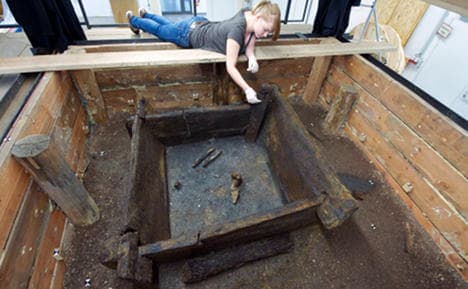Archeologists uncover 7,000-year-old wells

Archeologists have found what they believe to be the oldest water wells in Europe in eastern Germany. At 7,000 years old, they make their creators some of the earliest known carpenters.
Excavated earlier this year outside of Leipzig, Saxony, scientists from the University of Freiburg were able to date the wood used to line the well shafts back to between 5206 and 5098 BCE – the Early Stone Age.
The four wells, which reach seven metres into the earth and were likely used to provide a small settlement with fresh water, did not match up with what historians believed man was capable of at that time.
The discovery seemed to suggest that early settlers in the area were working with wood long before metal tools were invented, and points towards a much higher standard of living for early stone age settlers than initially thought.
Elaborate woodwork techniques made this even more apparent – the corners of the wells had been bound tight enough to survive 7,000 years underground - “it was a big surprise,” said Willy Tegel, the archeologist who headed the team.
Historians knew already that society in the area had gone through a boom period at around 5000 BCE, as hunter gathers began settling into villages. But barely anything from the era has survived, as it was mostly made from wood.
Starved of air and beneath the water level, the wooden walls of the wells somehow stood the test of time though. And now, historians are going to have to begin rethinking prior presumptions surrounding the Early Stone Age.
“In reconstructions, houses from this era have probably been underestimated,” said Tegel, whose findings were first published in the academic journal PIOS ONE this week.
DPA/The Local/jcw
Comments
See Also
Excavated earlier this year outside of Leipzig, Saxony, scientists from the University of Freiburg were able to date the wood used to line the well shafts back to between 5206 and 5098 BCE – the Early Stone Age.
The four wells, which reach seven metres into the earth and were likely used to provide a small settlement with fresh water, did not match up with what historians believed man was capable of at that time.
The discovery seemed to suggest that early settlers in the area were working with wood long before metal tools were invented, and points towards a much higher standard of living for early stone age settlers than initially thought.
Elaborate woodwork techniques made this even more apparent – the corners of the wells had been bound tight enough to survive 7,000 years underground - “it was a big surprise,” said Willy Tegel, the archeologist who headed the team.
Historians knew already that society in the area had gone through a boom period at around 5000 BCE, as hunter gathers began settling into villages. But barely anything from the era has survived, as it was mostly made from wood.
Starved of air and beneath the water level, the wooden walls of the wells somehow stood the test of time though. And now, historians are going to have to begin rethinking prior presumptions surrounding the Early Stone Age.
“In reconstructions, houses from this era have probably been underestimated,” said Tegel, whose findings were first published in the academic journal PIOS ONE this week.
DPA/The Local/jcw
Join the conversation in our comments section below. Share your own views and experience and if you have a question or suggestion for our journalists then email us at [email protected].
Please keep comments civil, constructive and on topic – and make sure to read our terms of use before getting involved.
Please log in here to leave a comment.